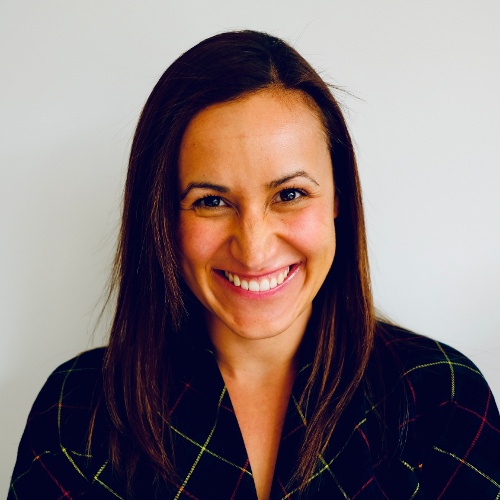
How we developed an industry-leading content marketing programme that's doubled its traffic every year
Andrea Warmington, Senior Content Strategist, is the brains behind Goodlord's evolving content strategy, which grew from a simple blog to a full multimedia content hub with webinars, e-books, reports, downloadable resources, news updates, and much more. Here's how she did it.
It started with a blog. That blog, which was updated once a week, along with a single white paper, was the extent of Goodlord's content marketing programme when I joined the business in 2018. But as Goodlord has scaled, so too has its content strategy. Now, the blog is just one element of our industry leading content marketing programme, which has grown to encompass regular white papers, data indexes, industry-wide surveys and reports, on-demand webinars, and even a podcast. We've also doubled both our mailing list and traffic every year along the way and, ultimately, helped to build awareness of Goodlord as a brand and cemented it as a thought leader. But it didn't happen overnight. Content, as everyone knows, is a long game.
Start small, think big
Newsagent, our multimedia content hub that launched in 2020, was always my goal for Goodlord's content strategy (even if the rest of the team didn't know it yet) - I wanted to get Goodlord's content to a point where it was considered an equal to the industry's other leading news sources. The blog was the first step towards that goal.
Back when I started, our blog posts, for the most part, were essentially operating as advertisements for Goodlord in disguise. They did not seek to help our readers so much as they did to sell our platform. But at that time, Goodlord was still a relatively unknown quantity. Letting agents didn't know who we were. We needed to earn their trust by demonstrating we understood the industry in which they were operating before we tried to sell to them.
A quick content audit showed that the blog's most successful posts to date had done just that - they had offered guidance to letting agents on how to navigate upcoming changes to GDPR or showed them how to build a social media strategy for their agency.
This more journalistic approach became the cornerstone of our blog content. We increased the frequency of our posts, publishing interviews with leading agents that shared their insights on the lettings industry, we covered the latest news, and we wrote easy-to-understand guides to legislation. These blog posts set out to help our readers, which, over time, earned their trust - the hallmark of any good content marketing strategy.
Iterate and experiment
Once we had a strong foundation in place, we could begin to layer on different types of content. We established a quarterly cadence for publishing gated whitepapers (which we prefer to call e-books), which dove deeper into the topics that had resonated most with our readers on our blog and started to bulk up our steadily-growing mailing list. We received hundreds of registrations for our first quarterly webinar, on the upcoming Tenant Fees Act (more on that later). We launched the monthly Goodlord Rental Index, which utilised our own data to track trends in the rental market, including average rents, void periods, tenant incomes, and more, which began to drive a steady flow of press mentions.
Buoyed by our success, in 2019, we undertook our most ambitious content project yet, conducting a national, industry-wide survey of letting agents to launch our annual State of the Lettings Industry Report, a mammoth piece of research that has become our flagship piece of thought leadership each year, generating both leads and significant press coverage for Goodlord.
And then, in 2020, we launched our pièce de résistance, Newsagent. This multimedia content hub sought to bring all of Goodlord's content together in one place, under its own brand, to make it easier for our audience to navigate between different types of content - while previously, they would have had to visit an assortment of unlined landing pages, now they could read a few articles on our blog, check out the latest data from the Goodlord Rental Index, and then download an e-book, while they were at it.
Do you think we stopped there? Of course we didn't. We continued to experiment with different types of content - adding downloadable templates, making our webinars available on demand, and even launching our very own podcast - as well as continuing to fine tune our existing content to ensure it was meeting our audience's needs.
Don't be afraid to follow the news
What's the secret to the continued success of our content marketing strategy? I believe it's because the underlying goal has remained the same throughout all of the content we create, from webinars to blog posts - we set out to help our readers. This has never been more clear than in the two great leaps forward our content marketing programme has taken, adding thousands of new people to our audience, both of which were driven by major news events.
The first was the Tenant Fees Act, which came into force in 2019, banning the charging of tenant fees. This was a seismic shift for the lettings industry, completely changing the way letting agencies operated. Much of the news coverage of the impending legislation at the time was sensationalist, but we took a different approach, aiming to equip agents with the information they needed to know to navigate this change. Our straightforward blogs, webinars, and e-books on the topic remain some of our most popular to date.
The second was the Covid-19 pandemic. I confess that, when news of the pandemic was first breaking in early 2020, I was nervous that any coverage we did would come across as clickbaity. But within a matter of weeks, we quickly pivoted our content strategy to focus almost single-mindedly on helping letting agents through this period of uncertainty as best we could. A webinar with an expert on diseases was organised in record time. An e-book in progress was scrapped in favour of one that focused on preparing agencies for remote working. Payment plan templates, initially designed for our customers, were made available to everyone, so that letting agents could work with their tenants and landlords to understand their financial situation.
The lesson? Don't be afraid to go where the news goes. You'll never be creating clickbait (at least, not in the traditional sense) if your underlying goal is to help your audience. That should always be the aim of any content you create.
Want to advance in your career? Check out the jobs we have available.
